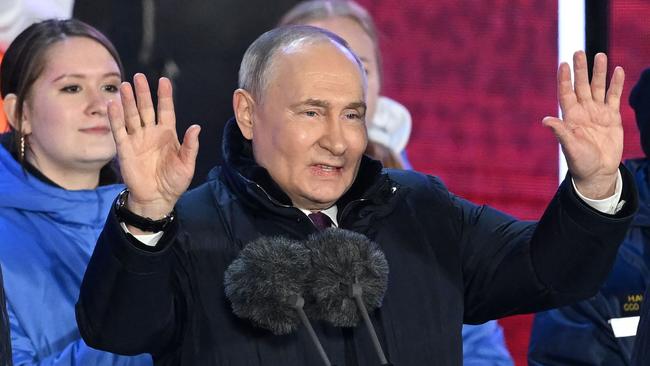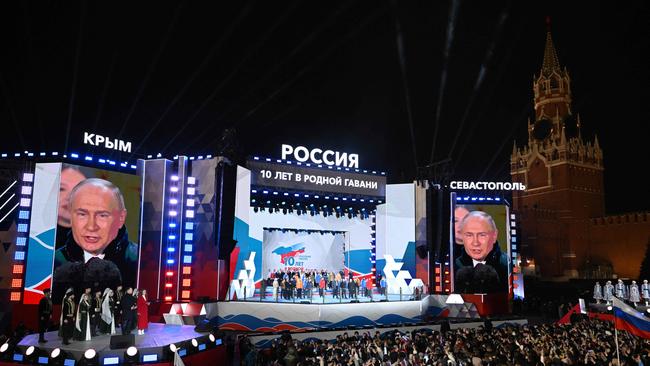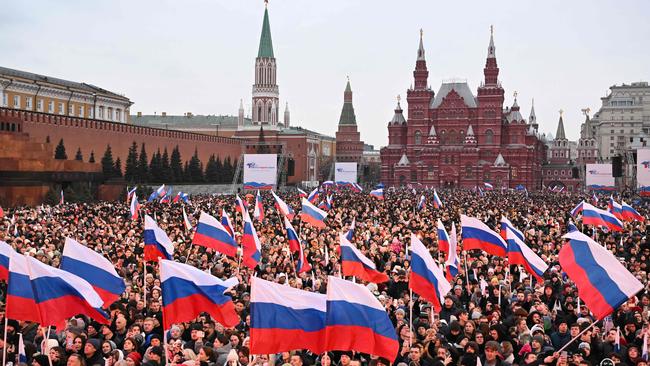Long live Russia, says Putin, the man with no rivals
Vladimir Putin sang the Russian anthem and shouted ‘Long live Russia!’ at a concert on Red Square after securing a fifth term of office at rubber-stamp elections.

President Vladimir Putin sang the Russian anthem and shouted “Long live Russia!” at a concert on Red Square overnight on Monday after securing a fifth term of office at rubber-stamp elections that were held after the death in prison of Alexei Navalny, the opposition leader.
His three nominal rivals, none of whom had directly criticised Putin during the campaign, joined him on stage. “Hand in hand, we will move forward and this will make us stronger,” Putin said to applause from a large crowd waving Russian flags.
The concert in Red Square was held to mark the 10th anniversary of the Kremlin’s annexation of Crimea from Ukraine in 2014. Opposition figures said students and government employees had been forced to attend. Some of those present said they had been made to stand in the cold for hours before the concert began.

Election officials loyal to the Kremlin said Putin had taken 87 per cent of the vote with an “unprecedented” turnout of about 75 per cent. He was congratulated by Moscow’s allies in China, Iran, North Korea and Venezuela, as well as by former Soviet states in Central Asia.
Russia also staged elections in areas of eastern and southern Ukraine that are under its control. In some cases armed men accompanied election officials to people’s homes. The Kremlin claimed that Putin had secured between 88 per cent and 95 per cent of the vote in the four occupied regions.
In Chechnya, which has witnessed two brutal Russian military campaigns since the 1990s, Putin was said to have won 98.9 per cent of the vote. In Belgorod, a city on the border with Ukraine that has been pounded by rockets in recent months, officials said Putin won 90 per cent of the vote and the turnout was 87 per cent.
Despite the improbability of the official results, Putin’s allies said the election was a perfect example of democracy in action.
Anna Kuznetsova, the deputy head of the Russian parliament, told state television: “Our President is today teaching democracy to the whole world.”
However, Golos, an independent Russian vote monitor, called the elections an “imitation” of democracy.
“Never before have we seen a presidential campaign that fell so far short of constitutional standards,” it said in a report.
The organisation has been called a “foreign agent” by the Kremlin, and Grigory Melkonyants, its co-chairman, was arrested in August on charges of working with a Western election monitoring group that has been banned in Russia.
Novaya Gazeta, a banned opposition newspaper, said voting patterns indicated that every second vote the Kremlin recorded for Putin was fraudulent.
Western countries have criticised the election as a sham aimed solely at extending Putin’s 24-year rule. He was due to stand down as President this year, but the Kremlin rewrote the constitution to allow him two more terms, which could see him remain in power until 2036, when he would be 83.
“The elections are obviously not free nor fair, given how Mr Putin has imprisoned political opponents and prevented others from running against him,” White House national security spokesman John Kirby said.

Putin claimed on Sunday that he had agreed to exchange Navalny for Russians held in the West on the condition that he remained outside the country. He also called him by his name for the first time in front of the cameras.
While Navalny was alive, Putin avoided saying his name aloud, referring to him instead as “this person”, or “the character you mentioned”, as well as several other epithets.
The opposition leader died suddenly last month in a harsh Arctic prison. His allies and Western leaders have said he was murdered on Putin’s orders.
“Putin called Navalny by name for the first time. A month after he cynically killed him. The bloodsucking bug revels in its impunity. It will burst soon and that will be some splash,” said Leonid Volkov, who was Navalny’s chief of staff when he tried to run for president in 2018. Mr Volkov was attacked last week outside his home in Lithuania by a suspected Russian agent who was armed with a hammer, and suffered a broken arm.
Maria Pevchikh, the head of Navalny’s FBK anti-corruption group, said last month that Navalny was due to be swapped for Vadim Krasikov, a Russian hitman serving a life sentence for murder in Germany.
She also said the exchange would involve two US citizens who are being held in Russian prisons. They were thought to be The Wall Street Journal reporter Evan Gershkovich and Paul Whelan, a former US marine.
The Kremlin has accused both men of espionage, a claim that has been rejected by the White House.
The Times





To join the conversation, please log in. Don't have an account? Register
Join the conversation, you are commenting as Logout